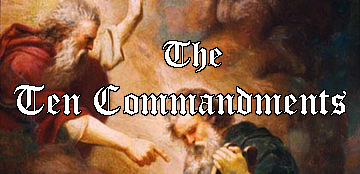



Statements of ideas can become lost inside documents: the statement exists inside the document but the document's size, complexity or location makes the statement inaccessible to the average person.
Many ideas recorded in large historical documents persist in the general dialogue (the minds of the general public) only through word-of-mouth recollections of the original. This almost invariably produces a distorted rendition of the original meaning. (See Chinese Whispers.)
The Christian Bible is one such dense historical volume, and one such notion is that Biblical teaching forbids the telling of lies.
This is not accurate. Although many Bible passages expresses disdain for ‘liars’*1, the ninth commandment only says: ‘Thou shalt not bear false witness against thy neighbour.’*2
To ‘bear false witness’ is to deliberately use a lie to harm another person e.g. 'Yes, officer, I saw him do it!.' (When in fact you didn't.) It is an over generalisation to conclude from the Commandment that any telling of a lie is sinful. For example, I can strike a match to light a candle or to burn down my neighbour's house. It is an over generalisation to say that striking a match is always a wrong thing to do—that depends on what you do with the match.
There may be many instances where telling a lie is the appropriate way to behave.
When someone asks you how you are going? And not wanting to burden them with your worries your reply: ‘Fine!’
In 1936 Munich, a Nazi SS officer asks Abraham Cohen if he is a Jew and he replies that he is not.
Telling an 85 year old terminal cancer patient, who is getting ready for a visit from her grandchildren, that she looks lovely.
The thrust of the commandment, ‘bearing false witness’, is about bringing harm to someone else by your deliberate action. What is a lie and what constitutes something considered sinful in Christian ethics is a complex and subtle area of discussion that defies black and white classification.
This is an example of an idea being buried inside a large and complex document. The text is read at some stage by someone, but after that it is passed by word of mouth through a process of Chinese Whispers and ends up in the popular discourse in a distorted form.
Footnotes
*1Proverbs 17:4 .. a liar giveth ear to a naughty tongue. Link
*1Jeremiah 50:35-36 A sword is upon the liars; Link
*1John 8:42-45 the devil, ... because there is no truth in him. When he speaketh a lie, he speaketh of his own: for he is a liar, and the father of it. Link
*2Exodus 20:1-17 The Ten Commandments Link